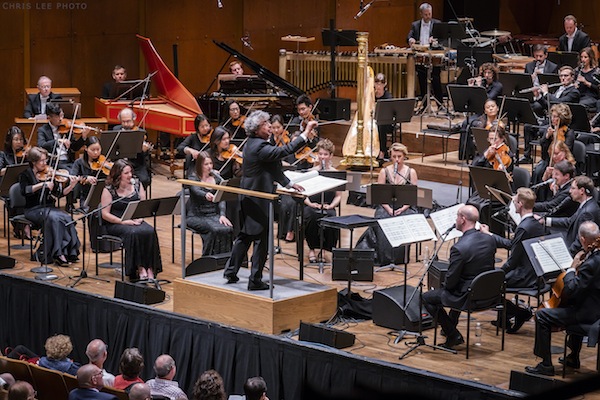Bychkov and Philharmonic find Berio’s humor, Strauss’s majesty

Semyon Bychkov conducted the New York Philharmonic with A Roomful of Teeth in Luciano Berio’s “Sinfonia” Thursday night at David Geffen Hall. Photo: Chris Lee
Following up on last week’s masterful Shostakovich, Semyon Bychkov has stayed in New York for a second set of subscription concerts with the New York Philharmonic. The Thursday program was made up of two pieces that on their face seemed entirely disconnected, but that hardly detracted from the experience: indeed, the mid-century rarity that opened the evening seemed every bit as momentous an occasion as the Romantic warhorse billed as the main attraction.
The top half’s oddball item was Luciano Berio’s Sinfonia of 1968, for orchestra and voices, commissioned by the Philharmonic fifty years ago, and dedicated to Leonard Bernstein (still omnipresent in his anniversary year, even if not through his own music). It’s hard to say whether this piece feels more amusing or obnoxious today. From its opening lines, invoking the classic French storybook introduction, “Il y avait une fois … ,” there’s a sense that it’s going to be a cheeky affair. There are moments of deep reflection in the work’s thirty-five-or-so minutes: the second movement, “O King” (the Rev. Dr., that is), is mournful and reverent, and the fourth finds an unearthly resonance in the open harmonies of the a cappella voices at its start.
The heart of the work, though, echoed in the first and final movements, is the third, “In ruhig fliessender Bewegung,” a marriage of darting, rapidly spoken text and flitting quotations pulled from countless familiar musical sources. The effect is like a radio tuner scanning for signals, catching little snatches of competing sound, enough to create a tiny morsel of sense, but not emerge into a coherent whole. Even the most erudite and attentive listener won’t be able to pick out and identify all the strains of Beethoven, Debussy, Boulez, Strauss, Stravinsky, Ravel, Schoenberg, and others as they whizz by: it’s invigorating, in a way, hearing all of these ideas weave so quickly in and out of each other, Samuel Beckett–like. And it’s extremely clever; in fact, one gets the distinct impression that the composer finds a certain satisfaction in demonstrating to the audience just how clever he is. To a listener who’s willing to entertain the piece as a joke at his own expense, Sinfonia is wickedly funny.
The Philharmonic under Bychkov gave a tight, piercing performance, joined by the wacky experimental vocal group Roomful of Teeth. This is a virtuoso ensemble—they nimbly managed the patchwork patter of the opening and the third movement, but felt just as home in the more sober contemplation of the even-numbered movements. Bychkov’s construction of the piece was superb, building the chaos one layer at a time.
The Berio performance was a major event, and yet the marquee item was still to come: after a series of speeches in honor of retiring musicians, the orchestra offered Richard Strauss’s massive Alpensinfonie. Bychkov led a vivid interpretation, bringing out all the pictorial power of the programmatic elements. In the thrilling stillness of the opening, there was something inescapably reminiscent of the start of Wagner’s Das Rheingold, as roiling activity grew steadily out of the darkness. The Philharmonic played with massive power in their portrayal of the Waterfall and found lovely, sun-drenched warmth in the Pastures.
An idyllic oboe solo and sweeping gestures perfectly evoked the majesty of the Summit, as the strings played with long bows to create a bright, soaring tone. The gleaming grandeur and spacious sound called to mind that great icon of German Romanticism, Caspar David Friedrich’s Wanderer Above a Sea of Fog.
Bychkov always manages to draw impressive sonic tension out of the Philharmonic, as he did in this performance, reaching feverish levels at the end of the Vision before suddenly dissipating into the rising Mists. There was an eerie, icy calm in the depiction of the fading sun, followed by aching beauty in the Elegy.
The storm, of course, was powerfully dramatic—some of the credit goes to Strauss’s flash and effects, complete with wind machine and thunder sheet, but the Philharmonic added to the excitement by playing with exceptional vigor, raging brilliantly before fading into the gorgeous, rich tones of the sunset and the closing bars.
Thursday’s program will be repeated 8 p.m. Saturday at David Geffen Hall. nyphil.org


